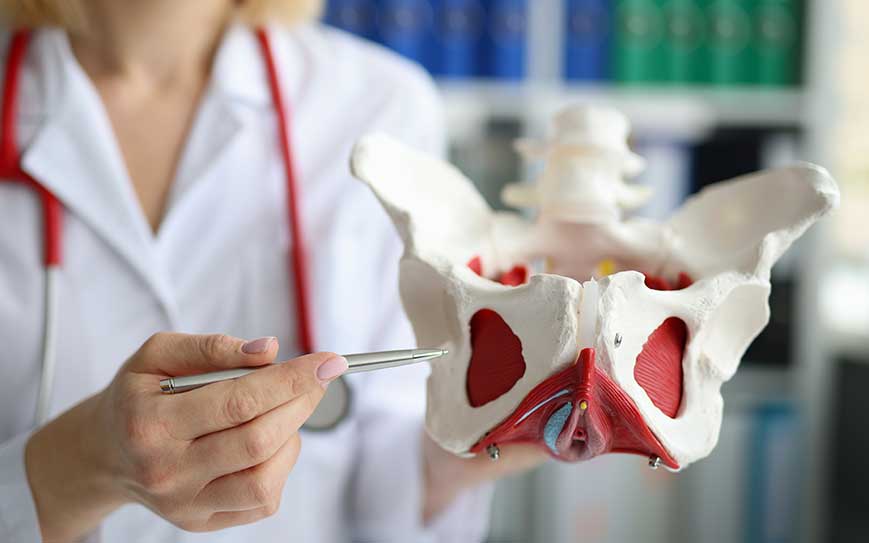
What is Pelvic Organ Prolapse, POP?
Your pelvic floor is a very important part of your core. It provides support for your vital organs and stability. When your core and pelvic floor weaken, you may become more susceptible to pelvic organ prolapse, POP. Although there is no one true cause of pelvic organ prolapse, it is always a good idea to work on strengthening your core and pelvic floor as a preventative measure.
What Exactly is Pelvic Organ Prolapse?
Pelvic organ prolapse (POP), is a pelvic floor dysfunction. Your pelvic floor muscles protect and support your lower organs such as the bowels, bladder, urethra, and uterus. When those muscles weaken and can’t properly support your organs, it can lead to one or more of your pelvic organs to descend into, or protrude from, the vaginal canal in women or the anus, in both men and women.
Causes of Pelvic Organ Prolapse
There is no one true cause of pelvic organ prolapse. However, there are many factors that can contribute to it. The most common cause is pregnancy and childbirth. While carrying and delivering a baby your muscles stretch and strain. This may result in your pelvic floor muscles not being able to support your organs as they should, and one or more of the organs may begin to descend. Chronic constipation is another potential cause of POP. It can be very hard on your pelvic floor due to the frequent straining and pushing. Long-term respiratory issues with chronic coughing can also increase your chances of POP. When you cough there is an increase in intra-abdominal pressures that result in additional pressure on your pelvic floor. A chronic cough would constantly be adding more and more pressure, thus weakening the pelvic floor. Certain surgeries, such as a hysterectomy, can also be a cause of pelvic organ prolapse.
Your choice of lifestyle can also be a cause of pelvic organ prolapse. Unhealthy habits such as excessive drinking, smoking, and an unhealthy diet can cause weight gain, which increases your chances of pelvic organ prolapse.
Essentially, anything that adds increased pressure on the abdomen could lead to pelvic organ prolapse.
Prevention is Key
If you are concerned about the potential of pelvic organ prolapse, there are a few things you can do to prevent it. First up is changing your lifestyle. But don’t worry, they can be very small and simple changes. For example, switching to a healthier diet with lots of fibre and water can help with constipation.
Another way to help prevent pelvic organ prolapse is by making sure you have a fit pelvic floor. Our Emsella – Libby Chair Pelvic Therapy is an amazing treatment for strengthening the pelvic floor. It is a non-invasive and comfortable treatment that delivers over 11,000 kegels in just one 28 minute session! The treatment uses high-frequency electromagnetic energy to stimulate the pelvic floor muscles. Certain Pilates exercises can also help strengthen your core without straining the pelvic floor or applying any additional pressure. Kegels are a great exercises to perform when you need to strengthen your pelvic floor, and can be done from the comfort of your own home. Here are a few great exercises to try.
There are Treatments Available
If you are struggling with pelvic organ prolapse, there are a few different ways to treat it. There are behavioural, mechanical, and surgical interventions. Behavioural treatments include exercises for strengthening your core and pelvic floor muscles. A great option is the above mentioned Emsella – Libby Chair Pelvic Therapy, delivering over 11,000 kegels in just one 28 minute session. A mechanical treatment would involve inserting a pessary, a small plastic device, into the vagina so it can support the descending organs. Of course, everything also depends on the severity of the pelvic organ prolapse. In some cases a surgical treatment may be required to repair the tissue/organ placement. However, it is recommended that you always speak to a doctor or pelvic health expert before assuming the worst case scenario.
Let Corelife Wellness Help You Prevent POP
Although there is no true cause of POP, there are plenty of preventative measures that you can take. From finding a healthier diet to our Emsella – Libby Chair Pelvic Therapy, we can be there for you every step of the way. At Corelife Wellness we focus on empowering women to take care of their pelvic health. Working alongside our physiotherapy experts, you can strengthen your pelvic floor and get back to feeling comfortable and confident.
Give us a call to discuss what you have been experiencing. Whether it’s pelvic organ prolapse or you want to focus on prevention, we can help!
Resources:
Learn more about our workshops and services

Recent Comments